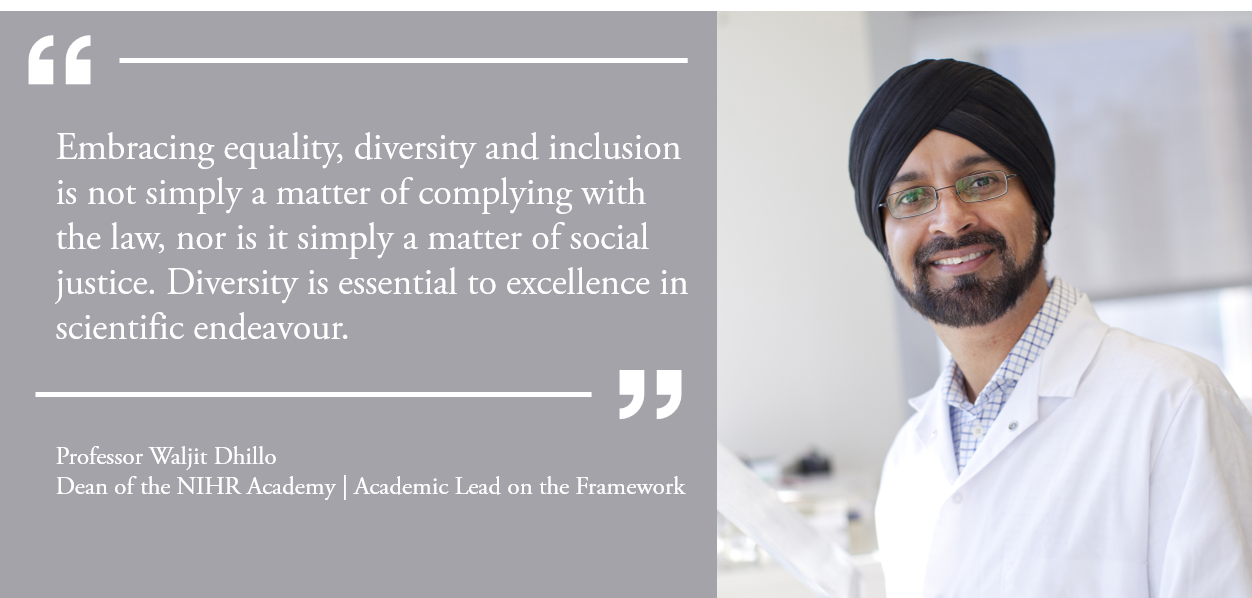Our Equality, Diversity and Inclusion Strategy 2022-2027
The BRC acknowledges that to undertake world-class translational research, we need to consider the people we support and the communities we serve. To ensure we do so systematically we have created an Equality, Diversity and Inclusion (EDI) Strategy to provide guidance and set the tone for the NIHR Imperial Biomedical Research Centre moving forwards.

A summary of our Underpinning Principles and Objectives can be found below to give a sense of what we value and will be encouraging for our researchers and research projects.
The full EDI Strategy can be accessed through this link and will be reviewed regularly.
For any EDI-related comments please reach out to the BRC Office team at brcofficer@imperial.ac.uk
Underpinning Principles
- Measurable: we will take an evidence-based approach in identifying issues or challenges in EDI within the BRC. Objectives and plans need to be SMART (Specific, Measurable, Attainable, Relevant, Time-based).
- Informed: to properly address any issues, it is important to fully understand what these are before taking a particular route to a solution. Issues need to be identified that are specific to each protected characteristic to support activities and policy development.
- Equitable: all activities should seek to be of equitable access. Barriers to engaging in an activity should be identified quickly in advance and addressed proactively.
- Proactive: it is important to act proactively to address barriers to equality. Those with leadership and management positions in the BRC, as well as those funded by the programmes, should actively seek to change current practice and culture where required.
- Reflective: it is important to reflect on both current policies, and recent actions within the BRC, to understand where changes may be required.
The six principal long-term objectives of our strategy
- To improve and diversify our recruitment and retention practices to develop a more balanced workplace, including diversity of senior leadership, governance, and decision-making positions within the BRC.
- To build diverse leadership capacity by creating equitable opportunities for current and future leaders.
- Signpost to existing mentoring schemes and create and support new schemes that are of strategic importance to the BRC.
- Signpost to existing networks and create and support new networks that are of strategic importance to the BRC.
- To advocate for a more equal, diverse and inclusive future within the BRC and beyond and play an active part in constructive challenge.
- Aim to ensure that the public we serve locally and nationally is reflected in the clinical and biomedical research we undertake through public involvement, engagement and participation in our research.
Support within the Imperial College and external
Imperial College London Support Links
Equality, diversity and inclusion – everything EDI-relevant.
Equality, Diversity and Inclusion Centre (EDIC)– a dedicated team to support staff and make Imperial a better place to work by promoting EDI.
Academic Women Association – a new network aims to provide women, in and outside academia, with a safe space to discuss and plan their careers in leadership roles.
Springboard Women’s Development Programme – an award-winning international programme which allows women to identify the clear, practical and realistic steps they want to take and allows them to develop the skills and self-confidence to take those steps.
IMPACT development programme– stands for Imperial Positive About Cultural Talent. It is a talent development programme for staff who identify as being from a minority ethnic group.
Calibre leadership programme – a talent development and leadership programme for staff who identify as neurodivergent or disabled, or who have a long-term physical or mental health condition.
External Learned and Professional Societies
The Royal Society has produced several reports and publications as part of its commitment to increasing diversity in science, technology, engineering and mathematics. Other societies may have information about their own EDI efforts, networks in their disciplines, or funding. For example:
- The Academy of Medical Sciences EDI work
- The Royal Academy of Engineering’s diversity and inclusion programme
- The Royal Society of Chemistry Inclusion and Diversity Fund
- The Institute of Physics diversity activities
- The Institution of Mechanical Engineering’s Diversity and Inclusion Committee
External Networks
- Higher Education Race Action Group (HERAG) – a network for anyone interested in advancing race equality in higher education.
- Women’s Engineering Society – a professional network for women engineers, scientists and technologists offering inspiration, support and professional development.
- LGBT+ Network of Networks in Higher Education – a national group of LGBT+ staff networks from universities and research institutions in the UK.





